 Sharry Aiken (Co-Editor-in-Chief)
Sharry Aiken (Co-Editor-in-Chief)
Sharry Aiken is an associate professor in the faculty of law at Queen’s University where she teaches immigration law, international refugee law, international human rights law, and administrative law. She has taught international refugee law at the American University in Cairo, and international criminal law in Osgoode’s professional LLM program. She is a two-time winner of the Queen’s LSS Award for Teaching Excellence. Prior to her appointment at Queen’s, Sharry practiced immigration and refugee law with legal aid clinics in Toronto (South Etobicoke Community Legal Services and the Refugee Law Office) and in private practice. She served as Editor-in-Chief of Refuge for ten years (2001-2011), transforming the journal from its original newsletter format to a peer reviewed, open access publication with SSHRC funding.
Professor Aiken has spent a great deal of her career advocating for human rights and social justice. A past president of the Canadian Council for Refugees and past co-chair of the Canadian Centre for International Justice, Sharry continues to be actively engaged in research and advocacy on refugee, immigration and access to justice issues. She is co-author of Immigration and Refugee Law: Cases, Materials and Commentary (Emond Montgomery), as well as the monograph, “Migration Law in Canada” in International Encyclopedia of Laws (Wolters Kluwer).
Sharry Aiken est professeure agrégée à la Faculté de droit de l’Université Queen’s où elle enseigne le droit de l’immigration, le droit international relatif aux réfugiés, le droit international des droits de l’Homme ainsi que le droit administratif. Avant sa nomination à l’Université de Queen’s, Sharry a pratiqué le droit de l’immigration et des réfugiés auprès de cliniques d’aide juridique à Toronto (South Etobicoke Community Legal Services et au Refugee Law Office) et en pratique privée. Elle a été rédactrice en chef de Refuge entre 2001 et 2011, transformant la Revue de son format originel de bulletin d’information à une revue à comité de lecture, à libre accès, et financé par le CRSH.
Ancienne Présidente du Conseil canadien pour les réfugiés et actuelle co-présidente du conseil d’administration du Centre canadien pour la justice internationale, Sharry demeure activement impliquée dans la recherche et le plaidoyer sur les enjeux touchant aux réfugiés, à l’immigration, et à l’accès à la justice. Elle est coauteure de l’ouvrage Immigration and Refugee Law : Cases, Materials and Commentary (Edmond Montgomery), dont la révision est actuellement en cours pour la 3e édition, et de la monographie « Migration Law in Canada » dans International Encyclopedia of Laws (Wolters Kluwer).
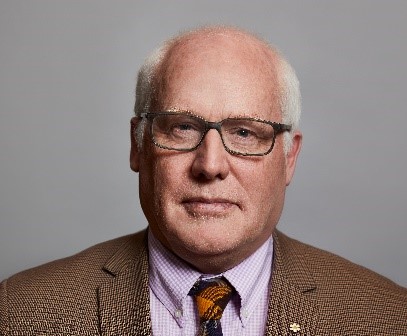 Alex Neve (Co-Editor-in-Chief)
Alex Neve (Co-Editor-in-Chief)
Alex Neve believes in a world in which the human rights of all people are protected. He served as Secretary General of Amnesty International Canada’s English Branch from 2000 - 2020. In that role he carried out numerous human rights research missions throughout Africa, Asia and Latin America, and closer to home to such locations as Grassy Narrows First Nation in NW Ontario and to Guantánamo Bay. He speaks to audiences across the country about a wide range of human rights issues, appears regularly before parliamentary committees and UN bodies, and is a frequent commentator in the media. Alex is a lawyer, with an LLB from Dalhousie University and a Master’s Degree in International Human Rights Law from the University of Essex. He has served as a member of the Immigration and Refugee Board, taught at Osgoode Hall Law School and the University of Ottawa, been affiliated with York University's Centre for Refugee Studies, and worked as a refugee lawyer in private practice and in a community legal aid clinic. He is a Senior Fellow at the Graduate School of International and Public Affairs at the University of Ottawa and serves on the Board of Directors of the Centre for Law and Democracy. Alex has been named an Officer of the Order of Canada and a Trudeau Foundation Mentor. He is a recipient of a Queen Elizabeth II Diamond Jubilee Medal. He has received honorary Doctorate of Laws degrees from St. Thomas University, the University of Waterloo and the University of New Brunswick.
Alex Neve croit en un monde dans lequel les droits humains de tous sont protégés. Il a été secrétaire général de la section anglaise d'Amnistie internationale Canada de 2000 à 2020. À ce titre, il a effectué de nombreuses missions de recherche sur les droits de la personne en Afrique, en Asie et en Amérique latine, et plus près de chez nous, à des endroits comme la Première nation de Grassy Narrows dans le nord-ouest de l'Ontario et à Guantánamo Bay. Il s'adresse à des auditoires partout au pays sur un large éventail de questions relatives aux droits de la personne, se présente régulièrement devant des comités parlementaires et des organes de l'ONU, et est un commentateur habituel dans les médias. Alex est avocat, titulaire d’un baccalauréat en droit de l’Université Dalhousie et d’une maîtrise en droit international des droits de la personne de l’Université d’Essex. Il a été membre de la Commission de l'immigration et du statut de réfugié du Canada, a enseigné à la faculté de droit Osgoode Hall Law School et à l'Université d'Ottawa, a été affilié au Centre for Refugee Studies de l'Université York et a travaillé comme avocat de droit des réfugiés en pratique privée et dans une clinique d’aide juridique communautaire. Il est chercheur principal à l'École supérieure d'affaires internationales et publiques de l'Université d'Ottawa et siège au conseil d'administration du Centre pour le droit et la démocratie. Alex a été nommé Officier de l'Ordre du Canada et mentor de la Fondation Trudeau. Il est récipiendaire d'une médaille du jubilé de diamant de la reine Elizabeth II. Il a reçu des doctorats honorifiques en droit de l'Université St. Thomas, de l'Université de Waterloo et de l'Université du Nouveau-Brunswick.
 Phillip Drew
Phillip Drew
Phillip Drew is the Assistant Dean, Juris Doctor and Graduate Legal Studies at Queen’s University Faculty of Law. He served in the Canadian Forces for thirty-one years before retiring in 2014. An Intelligence Officer during the first half of his military career, he was operationally deployed to the first Gulf War, Rwanda and on several other missions. After completing his JD at Queen’s he continued his career as a military lawyer. He earned his Doctorate in Law from the University of Frankfurt (Oder), and was an Associate Professor at the Australian National University College of Law. He has written extensively on the Law of Maritime Blockade, human rights in armed conflict, and on topics surrounding the lawful use of force. His most recent publication is an edited collection reflecting on the Rwandan genocide, Rwanda Revisited: Genocide, Civil War and the Transformation of International Law.
In 2018 he won the ANU College of Law’s Award for Teaching Excellence and was a finalist for the 2019 Australian Law Awards Academic of the Year.
Phillip Drew est doyen adjoint, docteur en droit et études juridiques supérieures à la faculté de droit de l'Université Queen's. Il a servi dans les Forces canadiennes pendant trente et un ans avant de prendre sa retraite en 2014. Un officier du renseignement pendant la première moitié de sa carrière militaire, il a été déployé opérationnellement lors de la première guerre du Golfe, au Rwanda, et dans plusieurs autres missions. Après avoir terminé son JD à Queen's, il a poursuivi sa carrière comme avocat militaire. Il a obtenu son doctorat en droit à l'Université de Frankfurt (Oder) et a été professeur associé à l'Australian National University College of Law. Il a beaucoup écrit sur le droit du blocus maritime, les droits de l'homme dans les conflits armés et sur des sujets entourant l'usage légal de la force. Sa publication la plus récente est une collection éditée réfléchissant sur le génocide rwandais, Rwanda Revisited: Genocide, Civil War and the Transformation of International Law.
En 2018, il a remporté le prix ANU College of Law pour l'excellence dans l'enseignement et a été finaliste pour les Australian Law Awards Academic of the Year 2019.
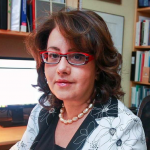 Pearl Eliadis
Pearl Eliadis
Pearl Eliadis is a human rights lawyer in Montreal. She serves as President of the Quebec Bar Association's Human Rights Committee and is designated as an expert in human rights and in post-conflict societies by the United Nations Development Programme. Pearl has successfully led complex, global projects dealing with national human rights institutions for 20 years, and has worked with the UN, the European Commission and the OSCE on wide a range of human rights issues in China, Ethiopia, Nepal, Rwanda, Sri Lanka, Sudan, Tajikistan and Timor-Leste. Pearl serves as Full Member of the McGill Centre for Human Rights and Legal Pluralism and as Adjunct Professor at McGill’s Law Faculty. She is cross-appointed to the Max Bell School of Public Policy and has published extensively on human rights and public policy. Her monograph Speaking Out on Human Rights: Debating Canada’s Human Rights System, won the Huguenot Society of Canada Award for freedom of expression and conscience in 2015. She also serves as a senior fellow of the Raoul Wallenberg Centre for Human Rights and was named a Human Rights Changemaker by Equitas in 2017. She is also a member of the Law Society of Ontario. Pearl received her common law and civil law degrees from McGill University and a B.C.L. (Oxon.) from the University of Oxford.
Pearl Eliadis est coprésidente du Centre canadien pour la justice internationale et est une avocate en droits de la personne de renommée mondiale qui dirige son propre cabinet à Montréal. Elle travaille principalement auprès de clients institutionnels et d’organisations multilatérales, incluant les Nations Unies, les institutions et agences européennes, certaines ONG, ainsi que des institutions nationales. Pearl est désignée par le PNUD comme experte en matière de droits de la personne et en situations post-conflit, et elle enseigne à la Faculté de droit de l’Université McGill. En tant que membre titulaire au Centre pour les droits de la personne et le pluralisme juridique, elle a publié de nombreux ouvrages sur les institutions en droits de la personne et sur des enjeux de politiques publiques qui s’y rattachent. Son livre Speaking Out on Human Rights : Debating Canada’s Human Rights System (MQUP, 2014) a remporté le prix de la Société Huguenot du Canada en 2015. Mme Eliadis est aussi Présidente du Comité sur les droits de la personne du Barreau du Québec (2013-) et détient une longue expérience d’implication auprès d’organisations communautaires et en droits de la personne. Elle a remporté de nombreux prix, y compris la Médaille du Jubilé d’or de Sa Majesté la Reine Elizabeth II, et a été nommée Human Rights Changemaker par Equitas en 2017.
 Vanita Goela
Vanita Goela
Vanita Goela has been Crown Counsel with the Public Prosecution Service of Canada since 2008. From 2002 to 2008, Vanita worked with the Department of Justice and in the private sector on public law files. Since completing an LLM, Vanita has published legal articles in the Dalhousie Law Journal and Charter and Human Rights Litigation. She is a former Contributing Editor for Charter and Human Rights Litigation. Vanita has also conducted pro bono research in Haiti on human trafficking and is a former coach, author and judge for the Laskin Moot.
Vanita Goela est procureure de la Couronne auprès du Service des poursuites pénales du Canada (SPPC). Avant de se joindre au SPPC en 2008, elle a travaillé aux dossiers de droit public en pratique privée et au ministère de la Justice. Elle est une ancienne rédactrice contributrice à la revue Charter and Human Rights Litigation. Depuis sa maîtrise en droit, maître Goela a publié des articles dans les journaux Dalhousie Law Journal et Charter and Human Rights Litigation. Elle a effectué de la recherche bénévole à Haïti sur la traite humaine et elle s’est impliquée au Concours Laskin et tant que juge, auteur du problème officiel et entraîneur.
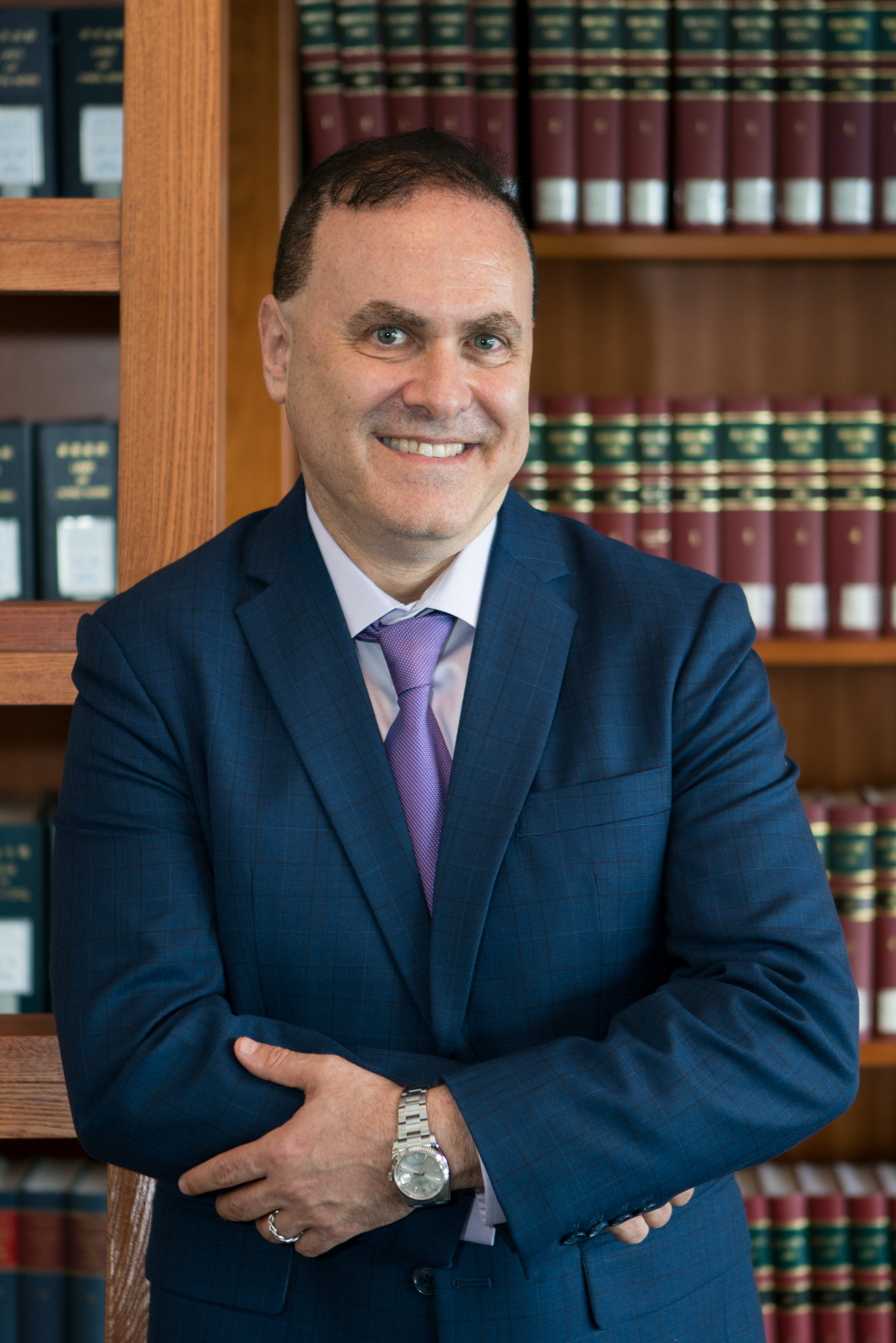 Gregory S. Gordon
Gregory S. Gordon
Professor Gregory S. Gordon teaches at the Chinese University of Hong Kong Faculty of Law where he formerly served as Associate Dean (Development/External Affairs) and Director, Research Postgraduates Programme. He has coached the CUHK Jessup and ICC Moot teams. In 2019, his team took second place (out of 70 teams worldwide) at the ICC Moot Competition in The Hague. Prior to joining CUHK, he was a tenured faculty member at the University of North Dakota School of Law and Director of the UND Center for Human Rights and Genocide Studies. Not long after earning undergraduate and law degrees from Berkeley, he served as an attorney with the ICTR on the landmark “Media” cases, the first international post-Nuremberg incitement prosecutions of media executives. For this work, he received a commendation from U.S. Attorney General Janet Reno. He subsequently worked with the U.S. Department of Justice, serving, in sequence, as a street crime, white collar crime, organized crime and then human rights prosecutor (the latter for the Office of Special Investigations, the so-called “Nazi Hunters Unit”). While at DOJ, he was detailed to Sierra Leone to conduct a post-civil war justice assessment and served as a Special Assistant US Attorney for the District of Columbia. He has tried 24 cases in his career; 23 to a favorable verdict.
Professor Gordon has been featured on CNN, C-SPAN, NPR, the BBC and Radio France Internationale and was the BBC World News live television analyst for the announcement of the historic Charles Taylor trial verdict. A leading expert on incitement law, his work has been featured in an NPR broadcast by Academy Award-winning actor Morgan Freeman. His book Atrocity Speech Law: Foundation, Fragmentation, Fruition, proposing a new paradigm for international hate speech law, was published by Oxford University Press in 2017. In 2018, he won the Chinese University’s Research Excellence Award. Professor Gordon has trained Ethiopian federal prosecutors in Addis Ababa, prosecutors at the ECCC for the Khmer Rouge leadership trial, and attorneys and judges in Sarajevo for war crimes trials. Among other venues, he has presented his scholarship at the ICC, the U.S. Army J.A.G. School, the Harry S. Truman Presidential Museum and Library, and the U.S. Holocaust Memorial Museum. He is a Research Fellow with the International Centre for Law Research and Policy (CILRAP) and serves as a consultant for the International Nuremberg Principles Academy. For 2019-2020, he is writing a biography of Nuremberg prosecutor Benjamin Ferencz and is Visiting Fellow at the European University Institute and the Georgetown University Law Center.
Le professeur Gregory S. Gordon enseigne à la faculté de droit de l'Université Chinoise de Hong Kong (UCHK), où il a été auparavant Doyen Associé (Développement / Affaires Extérieures) et Directeur du Programme de Formation Postdoctorale. Il entraîné les équipes Moot de UCHK pour les concours Jessup et Cour Pénal International (CPI). En 2019, son équipe a remporté la deuxième place (sur 70 équipes dans le monde) au concours CPI à La Haye. Avant UCHK, il était professeur titulaire à la faculté de droit de l'Université du Dakota du Nord et directeur du Centre UND pour les Droits de l'Homme et les Études sur le Génocide. Peu après avoir obtenu son diplôme de premier cycle et son diplôme en droit à Berkeley, il a été avocat auprès du TPIR dans le cadre des affaires historiques «Médias», les premières poursuites internationales contre des responsables d'incitation à la haine post-Nuremberg. Pour ce travail, il a reçu une mention élogieuse du procureur général des États-Unis, Janet Reno. Il a ensuite travaillé pour le Ministère de la Justice des États-Unis, occupant successivement les fonctions de procureur des crimes de rue, crimes en cols blanc, crime organisé, puis de procureur des droits de l’homme (pour le Bureau des Enquêtes Spéciales, le soi-disant service des chasseurs des Nazis). Au Ministère de la Justice, il a été envoyé en Sierra Leone pour mener une évaluation post-guerre civile des approches potentielles pour la justice et il a exercé les fonctions de Procureur Spécial des États-Unis pour le District de Columbia. En tant que plaideur ou procureur, il a jugé 24 affaires au cours de sa carrière ; 23 d'entre eux à un verdict favorable.
Le professeur Gordon a comparu en tant qu'expert pour CNN, C-SPAN, NPR, BBC et Radio France Internationale, et il a été l'analyste en direct de la télévision sur BBC World News pour l'annonce du verdict du procès historique de Charles Taylor. Spécialiste mondial du droit de l'incitation, son travail universitaire a été présenté dans l'émission NPR diffusée par Morgan Freeman, acteur primé aux Oscars. Son livre Atrocity Speech Law: Foundation, Fragmentation, Fruition, proposant un nouveau paradigme pour le droit international du discours de haine, a été publié par Oxford University Press en 2017. En 2018, il a remporté le Research Excellence Award de l’Université Chinoise. Le professeur Gordon a formé des procureurs fédéraux éthiopiens à Addis-Abeba, des procureurs aux CETC pour le procès contre la direction des Khmers rouges et des avocats et juges à Sarajevo pour des procès pour crimes de guerre en en ex-Yougoslavie. Il a notamment présenté ses travaux académiques à la Cour Pénale Internationale, l’école US Army J.A.G., le musée- bibliothèque présidentiel Harry S. Truman, ainsi que le musée commémoratif américain de l’Holocauste. Il est chercheur au Centre international de recherche sur le droit et les politiques (CILRAP) et est consultant pour l’Académie internationale des principes de Nuremberg. Pour 2019-2020, il rédige une biographie du procureur à Nuremberg Benjamin Ferencz et il est chercheur invité à l'Institut Universitaire Européen et au Centre de Droit de l'Université de Georgetown.
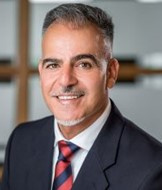 Ardi Imseis
Ardi Imseis
Ardi Imseis is interested in the intersection of power, politics, law, and justice, and the practical impact of those phenomena on international relations in general and on underrepresented peoples in particular. Professor Imseis is currently working on a book which critically examines the gulf between international law and United Nations action, using the question of Palestine as a case study. He comes to Queen’s following a 12-year career as a UN official in the Middle East, first with the United Nations Relief and Works Agency for Palestine Refugees in the Near East (UNRWA), and then with the United Nations High Commissioner for Refugees (UNHCR). Since leaving the UN, Imseis has continued to engage in high-level public advocacy on international law, peace and security, including two invited addresses to the UN Security Council. In December 2019, the United Nations High Commissioner for Human Rights appointed Imseis a Member of the Group of Eminent International and Regional Experts, a commission of inquiry mandated by the UN Human Rights Council to investigate and report on violations of human rights and humanitarian law in the conflict in Yemen. He also serves as the Associate Academic Director of the International Law Programs that Queen's Law offers at the Bader International Study Centre, Herstmonceux Castle, East Sussex, United Kingdom.
Professor Imseis’s scholarship has appeared in, inter alia, the American Journal of International Law, the Berkeley Journal of International Law, the Harvard International Law Journal, the Oxford Journal of Legal Studies, and the University of British Columbia Law Review. He is a member of the Advisory Board of the Third World Approaches to International Law Review. He is former Editor-in-Chief of the Palestine Yearbook of International Law (2008-2019), Visiting Research Scholar, Department of Law, American University in Cairo and Harlan Fiske Stone Scholar and Human Rights Fellow, Columbia Law School.
Imseis is admitted to the practice of law in the province of Alberta. Between 2010 and 2011, he served as Senior Legal Counsel to the Honourable Catherine A. Fraser, Chief Justice of Alberta.
Ardi Imseis s'intéresse à l'intersection du pouvoir, de la politique, du droit et de la justice, et à l'impact pratique de ces phénomènes sur les relations internationales en général et sur les peuples sous-représentés en particulier. Le professeur Imseis travaille actuellement sur un livre qui examine de manière critique l’écart entre le droit international et l’action des Nations Unies, en utilisant la Palestine comme étude de cas. Il arrive chez Queen's après une carrière de 12 ans en tant que fonctionnaire des Nations Unies au Moyen-Orient, d'abord à l'Office de secours et de travaux des Nations Unies pour les réfugiés de Palestine dans le Proche-Orient (UNRWA), puis au Haut-Commissariat des Nations Unies pour les réfugiés (UNHCR). Depuis son départ de l'ONU, Imseis a continué à s'engager dans un plaidoyer public de haut niveau sur le droit international, la paix et la sécurité, y compris deux allocutions invitées au Conseil de sécurité de l'ONU. En décembre 2019, le Haut-Commissaire des Nations Unies aux droits de l'homme a nommé Imseis membre du Groupe d'éminents experts internationaux et régionaux, une commission d'enquête mandatée par le Conseil des droits de la personne des Nations Unies pour enquêter et faire rapport sur les violations des droits de la personne et du droit humanitaire dans le conflit au Yémen. Il est également directeur académique associé des programmes de droit international offerts par Queen's Law au Bader International Study Centre, Herstmonceux Castle, East Sussex, Royaume-Uni.
Les travaux du professeur Imseis ont été publiés, entre autres, dans l’American Journal of International Law, le Berkeley Journal of International Law, le Harvard International Law Journal, l’Oxford Journal of Legal Studies et la University of British Columbia Law Review. Il est membre du conseil consultatif de la Third World Approaches to International Law Review. Il est ancien rédacteur en chef du Palestine Yearbook of International Law (2008-2019) ; chercheur invité, Département de droit, Université américaine du Caire ; et Harlan Fiske Stone Scholar et Human Rights Fellow, Columbia Law School.
Imseis est admis à la pratique du droit dans la province de l'Alberta. Entre 2010 et 2011, il a été conseiller juridique principal de l'honorable Catherine A. Fraser, juge en chef de l'Alberta.
 Johanne Levasseur
Johanne Levasseur
Johanne Levasseur spent most of her professional career as a lawyer with the Department of Justice of Canada. She worked for several years in immigration and refugee law and then in human rights law in Montreal and Ottawa. After graduating from the Graduate Institute of International Studies in Geneva with a graduate degree in international law, she specialized in international human rights law. She has also acted as Regional Legal Advisor for Humanitarian Law Advisory Services of the International Committee of the Red Cross (ICRC). In this capacity, she advised several national authorities on measures to implement international humanitarian law.
Johanne Levasseur a fait la plus grande partie de sa carrière professionnelle comme avocate au sein du ministère de la Justice du Canada. Elle a travaillé plusieurs années en droit de l’immigration et des réfugiés puis en droits de la personne, à Montréal et à Ottawa. Après avoir obtenu un diplôme d’études supérieures en droit international à l’Institut des Hautes études internationales à Genève, elle s’est spécialisée en droit international des droits de la personne. Elle a aussi agi comme conseillère juridique régionale pour les Services consultatifs en droit humanitaire du Comité international de la Croix-Rouge (CICR). A ce titre, elle a conseillé plusieurs autorités nationales sur les mesures de mise en œuvre du droit international humanitaire.
 Sylvie McCallum Rougerie
Sylvie McCallum Rougerie
Sylvie McCallum Rougerie is legal counsel with the Department of Justice Canada in the Northern Regional Office in Whitehorse, Yukon. From 2014 to 2019, she was counsel in the Human Rights Law Section of the Department of Justice Canada, where she advised on the Canadian Charter of Rights and Freedoms and international human rights law. Sylvie holds a J.D. from the University of Toronto and an LL.M. in Advanced Studies in European and International Human Rights Law from Leiden University. Her graduate work was awarded the 2017 Thoolen NJCM-Dissertation Prize by the Dutch Section of the International Commission of Jurists. She has a long-standing interest in the rights of women and girls, and has pursued this interest working with human rights organizations in Kenya and Bangladesh. She is a member of the Law Societies of Ontario and Yukon.
Sylvie McCallum Rougerie est avocate au sein du bureau régional du Nord du ministère de la Justice Canada, au Yukon. De 2014 à 2019, elle fut avocate à la Section des droits de la personne du ministère de la Justice Canada. Ses champs d’expertise comprennent le droit international des droits de la personne et la Charte canadienne des droits et libertés. Sylvie possède des diplômes de l’Université de Toronto (J.D.) et de l’Université Leiden (LL.M. en études avancées en droit européen et international des droits de la personne). Sa thèse de maîtrise a reçu le prix Thoolen NJCM-Dissertation en 2017, accordé par la section néerlandaise de la Commission internationale de juristes. Elle a un intérêt marqué pour les droits des femmes et des filles, et a poursuivi cet intérêt en travaillant avec des organismes de défense des droits au Kenya et au Bangladesh. Elle est membre du Barreau de l’Ontario et du Barreau du Yukon.
 Darryl Robinson
Darryl Robinson
Darryl Robinson is an Associate Professor at Queen's University Faculty of Law. His research seeks to develop a humanistic system of international justice, which is fair in its treatment of individuals, mindful of competing societal goals, and inclusive of diverse global perspectives.
Professor Robinson was a Hauser Scholar at New York University School of Law and a Gold Medalist at Western University Faculty of Law. After clerking at the Supreme Court of Canada, he served as an international lawyer at Foreign Affairs Canada (1997-2004), working on international criminal, humanitarian, and human rights law. His work in the creation of the International Criminal Court and Canada’s war crimes legislation earned him a Minister's Citation and a Minister's Award for Foreign Policy Excellence. He served as an adviser in the International Criminal Court Office of the Prosecutor from 2004 to 2006. Professor Robinson has received several research grants, particularly on the study of crimes against humanity, and is a member of a $2.5 million SSHRC partnership on strengthening international justice. He was the 2013-14 recipient of the Antonio Cassese Prize for International Criminal Legal Studies.
Darryl Robinson est professeur agrégé à la Faculté de droit de l'Université Queen's. Ses recherches visent à développer un système humaniste de justice internationale, qui est juste dans son traitement des individus, conscient des objectifs sociétaux concurrents, et incluant des perspectives mondiales diverses.
Le professeur Robinson a été boursier Hauser à la New York University School of Law et médaillé d'or à la Faculté de droit de l'Université Western. Après avoir été auxiliaire juridique à la Cour suprême du Canada, il a été avocat international aux Affaires étrangères Canada (1997-2004), où il a travaillé en droit international, notamment en droit criminel, droit humanitaire et droit de la personne. Son travail dans la création de la Cour pénale internationale et de la législation canadienne sur les crimes de guerre lui a valu une citation du Ministre et un prix du Ministre pour l'excellence en matière de politique étrangère. Il a été conseiller au Bureau du Procureur de la Cour pénale internationale de 2004 à 2006. Le professeur Robinson a reçu plusieurs subventions de recherche, en particulier sur l'étude des crimes contre l'humanité, et est membre d'un partenariat de 2,5 millions de dollars du CRSH sur le renforcement de la justice internationale. Il a reçu le Prix Antonio Cassese 2013-2014 pour les études juridiques criminelles internationales.
 Irit Weiser
Irit Weiser
Irit Weiser has spent most of her career with the federal Department of Justice. She was Senior General Counsel and Head of Legal Services for Health Canada and the Public Health Agency of Canada. She provided legal, policy and strategic advice to senior levels of government in regard to various health-related matters, including the Canada Health Act, food and drug regulation, quarantine, and tobacco. Prior to heading up Health Legal Services, Irit was General Counsel and Director of the Human Rights Law Section of the Department of Justice. She provided legal and policy advice, and litigation support on the Canadian Charter of Rights and Freedoms, the Canadian Human Rights Act and international human rights law. Before joining the Department of Justice, Irit worked for the Lawyers Committee for Human Rights in New York. She has also taught International Human Rights at the Faculty of Law of the University of Ottawa. Finally, she has written articles and presented papers on international human rights matters, the Canadian Charter of Rights and Freedoms, and health law. Since retiring, Irit has become involved in a number of pro bono activities, including providing legal assistance to private sponsors through the Refugee Sponsorship Support Program. She is also a member of the Research Ethics Board of the Ottawa Health Science Network, the Council of the Royal College of Physicians and Surgeons of Canada, and Royal College International.
Irit Weiser a mené une longue carrière au sein du ministère de la Justice. Elle était avocate générale principale et cheffe d’équipe des Services juridiques pour Santé Canada et pour l’Agence de la santé publique du Canada. Elle a fourni des avis juridiques, stratégiques et en matière de politiques publiques à de hautes instances gouvernementales sur divers enjeux relatifs à la santé, incluant la Loi canadienne sur la santé, la règlementation sur les aliments et drogues, les mesures de quarantaine, et le tabac. Avant d’être responsable des Services juridiques en matière de santé, Irit a été avocate générale et Directrice de la Section des droits de la personne du ministère de la Justice. Elle a fourni des conseils juridiques et en matière de politiques publiques, et a assuré un appui en litige au sujet de la Charte canadienne des droits et libertés, de la Loi canadienne sur les droits de la personne, et du droit international des droits de la personne. Avant de rejoindre le ministère de la Justice, Irit a travaillé pour le Lawyers Committee for Human Rights à New York. Elle a aussi enseigné le droit international des droits de la personne à la Faculté de droit de l’Université d’Ottawa. Enfin, elle a rédigé des articles et a présenté des essais en droit international des droits de la personne, sur la Charte canadienne des droits et libertés, et en droit de la santé. Depuis qu’elle a quitté ses fonctions, Irit s’est impliquée dans plusieurs activités bénévoles, notamment en offrant un appui juridique aux parrainages privés par l’entremise du Programme d’appui au parrainage de réfugiés. Elle est également membre du Conseil d’éthique de la recherche du réseau de science de la santé d’Ottawa, du Conseil du Collège royal des médecins et chirurgiens du Canada et du Collège royal international.
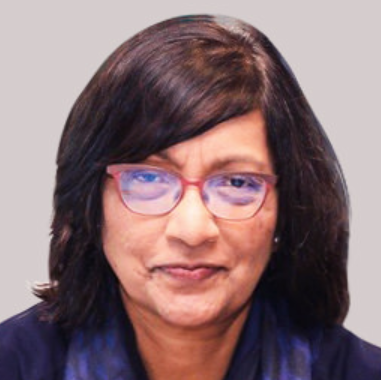 Malliha Wilson
Malliha Wilson
Malliha Wilson is senior partner at Nava Wilson LLP, specializing in litigation (information on the firm can be found at navawilson.law). Previously, she was special legal advisor at the Investment Management Corporation of Ontario, providing corporate and regulatory advice. She was also Assistant Deputy Attorney General, (Civil) in charge of all civil legal services for the Ontario government. She won the Osgoode Hall Law School Alumni Gold Key Award, Public Sector Category, and the Distinguished Career Award, South Asian Bar Association of Toronto. She was Senior Appellate Litigation Counsel with the Ontario government for more than 30 years with more than 20 notable cases at Supreme Court of Canada and Ontario Court of Appeal. As author and speaker, she has made more than 40 papers and presentations. She is dedicated to Human rights and Relief efforts in Sri Lanka in relation to the minority Tamil Community.
Malliha Wilson est associée principale chez Nava Wilson SENCRL où elle se spécialise en litige (pour plus d’informations au sujet du cabinet, consultez navawilson.law). Auparavant, elle était conseillère juridique spéciale pour la Société de gestion de placements de l’Ontario, fournissant des conseils en matière d’entreprise et de régulations. Elle a également occupé le poste de sous-procureure générale adjointe (civil), responsable des services juridiques au civil pour le gouvernement de l’Ontario. Elle s’est vue décerner le Osgoode Hall Law School Alumni Gold Key Award (catégorie du service public), le Distinguished Career Award du South Asian Bar Association de Toronto. Pendant plus de 30 ans, elle a été avocate-conseil d’appel principale en litige pour le gouvernement de l’Ontario, et a défendu plus de 20 causes notoires devant la Cour suprême du Canada et devant la Cour d’appel de l’Ontario. En tant qu’auteure et conférencière, elle a produit plus de 40 essais et présentations. Elle est dévouée aux droits de la personne et aux opérations de secours au Sri Lanka en ce qui a trait à la communauté minoritaire tamoule.
Past Editorial Board Members/ Anciens membres du comité de rédaction
- James Hendry (Founding Editor-in-Chief/Rédacteur en chef fondateur, 2017-2022)
- Joseph Rikhof (Founding Editor/ Éditeur fondateur, 2017-2022)
- Ken Watkin (2020-2023)
Editorial Interns/ Stagiaires rédactionnels (2023 - 2024)
 Andrada Marinescu
Andrada Marinescu
Andrada Marinescu is a third-year J.D. student at Queen’s University, where she also completed a Bachelor of Arts (Honours) in Political Studies. Following her first year of law school, she completed a certificate in Public International Law at Bader College in the United Kingdom, where she discovered her interest in international law.
Andrada held the role of Editorial Intern with the PKI Global Justice Journal from 2022-2023, where she assisted with the copyediting and digital publication of journal articles and special issues. She is thrilled to be joining the Department of Justice in Ottawa both as an intern in her final semester of law school, and as an Articling Student in the Legal Excellence Program next fall.
 Joel Friesen, Editorial Intern
Joel Friesen, Editorial Intern
Joel Friesen is a third-year law student at Queen’s University in Kingston, Ontario. He holds a Bachelor of Arts (Honours) in Psychology from Trinity Western University. This summer, he completed an internship with the Global Centre for the Responsibility to Protect in Geneva, Switzerland.
Since entering law school, Joel has completed a certificate in Public International Law at Bader College in the United Kingdom and worked as a student caseworker with the Queen’s Prison Law Clinic, and will be interning with the Department of Justice Criminal Policy Section in his final semester of law school.
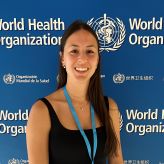 Claire Millard, Editorial Intern
Claire Millard, Editorial Intern
Claire Millard is a second-year J.D. student at Queen’s University in Kingston, Ontario. In 2021, she graduated with an Honours Bachelor of Medical sciences from Western University specializing in Biochemistry and Cancer Biology.
Throughout her undergraduate studies, Claire worked as a part of the Bachelor of Medical Sciences Association team, working on the communications and blog committee. During her first year at Queen’s law, she volunteered with the Queen’s Law Journal in a volunteer editor position. This summer, Claire completed the Public International Law program at Bader College.
 Nillab Hassani, Editorial Intern
Nillab Hassani, Editorial Intern
Nillab Hassani is a third-student at the Queen’s University in Kingston, Ontario. She holds a Bachelor of Arts (Honours) in Criminology from Wilfrid-Laurier University and a Bachelor of Arts in Political Science from Université de Montréal. This summer, she completed an internship with the United Nations Relief and Works Agency for Palestine Refugees in the Near East (UNRWA) in Jerusalem.
Since entering law school, Nillab completed a certificate in Public International Law at Bader College in the United Kingdom and was a competitive moot oralist in the Philip C. Jessup International Law Moot. This year, she will be a Grand Moot oralist before the Court of Appeal for Ontario and a student caseworker with the Queen's Prison Law Clinic.